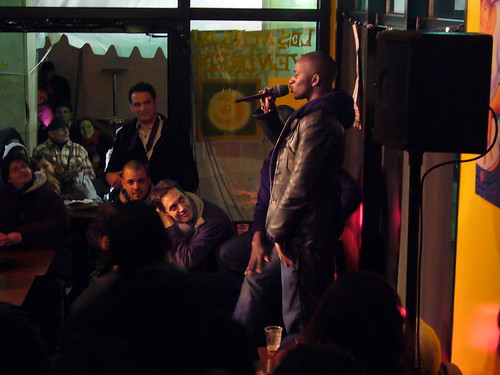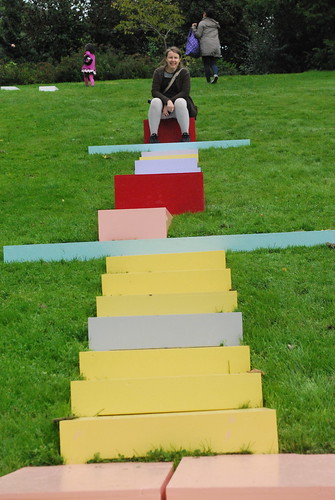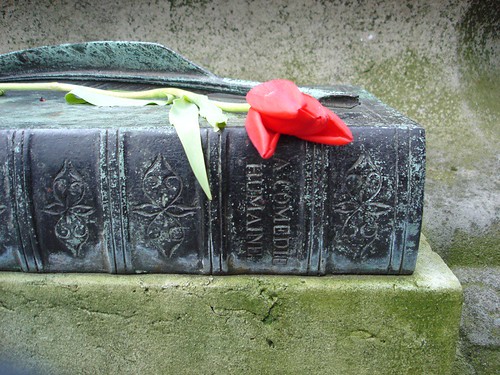Category: "Music, literature, arts..."
10/10/12
Time to get it out!
The last entries in this blog will concern what probably ought to be the final part of any research project: getting the material out and beyond a blog like this and the narrow circles of colleagues and the odd conference.
The first media to pick up on my finished thesis its defence was an art and culture program on NRK P2, the Norwegian equivalent to BBC Radio 4 or France Culture (or perhaps somewhere between the latter and France Info, since Norway can never come up with anything as high brow, philosophical and educational as France Culture…). I liked that it was this particular radio channel, and that it was the literary and arts aspect of the work that caught their eye, not the sociological or political. They wanted me to cycle down to their studio and talk about my project, experience, scientific treatment and its conclusions. My very first radio interview went quite well. They even made me spontaneously recite the poem I had performed a couple of times at slam sessions in Paris. I still find it quite touching to do that. The clip starts with an extract of Enfant de la ville by Grand Corps Malade (read interview about the album in French here), which is very typical of the most famous French slam artist, and perhaps also of French slam in general, as it treats the artist’s relationship to the city. At the end of the clip, Grand Corps Malade appears again in A la recherche where he is featured by two grand old men in French rap, Kery James and Oxmo Puccini. This is not very typical of the genre, but I think the journalists thought it worked well on the radio.
Here’s the clip: Kulturhuset, NRK P2, 27.09.12
The day afterwards, another of my favourite Norwegian media, Klassekampen, phoned for an interview. (It’s only accessible through logging in to something). The journalist is probably one of the most familiar with French literature and society here, and I appreciated her headline: “ Accuses the state from the stage”.
25/03/10
10 days intervals for a peaceful but alert diary-keeper’s mind

Ethnographic documentation? Art? Anyway: It’s spring! Let not the expulsions blossom - Resist!
When I started blogging again, I gave myself a 10-days interval between blog posts. The interval should be long enough to be realistic and feel comfortable, but not so long that I lose sight of the trains of thought I keep on track here. To blog regularly, sharpens the attention (as I said a long time ago here) to the little tidbits that pop up in the mind which somehow connect to the research process, without being speaking directly to what I’m working on.
There are a couple of blog posts at various stages along the production line, but as I discovered today that I’m three days late for my self-imposed 10 days deadline, I’ll skip the mindfulness and instead just quickly sum up one thing I’ve been working on lately.
At the same time as I read Knausgård and pondered upon anthropological elements in novels, Aleksandra Bartoszko interviewed me (in Norwegian) about some photos I’d taken during my fieldwork in Paris. Inspired by an art exhibition (see the interviews with the artists Lange and Heier), she made a series of interviews on ethnography and art and asked me about how I saw the differences between the two. I’d never thought of my photos neither as ethnography nor as art, and she made me think about the criteria I – until then, unconsciously – confer on the one and the other. The co-occurrence of the interview and my plunge into fiction inspired me to initiate a workshop on Representations of social life (Norw.) at the Norwegian Anthropological Association’s annual meeting, which Aleksandra and I will co-chair.
12/03/10
Writing and performance

It was hard picking a photo for this post. So many of my photos evoke memories from my many slam nights in Paris, but how to find a photo that can convey some of theses feelings to the readers of this blog… With this one, I hope to put across the mundaneness of French slam (the greengrocer’s Sharazade in the background), as well as some of it’s diversity of participants.
My thesis takes shape from the margins, and slowly, slowly am I circling in the core chapters. I don’t think this is a particularly good way of composing the general argument of the work, but I have a fairly good idea of why the core content just keep slipping away from me. The final part of this core, the chapter where I give an in depth analysis of the slam sessions, is finally now on its way. Thus on a deeper level, it feels like I’ve always had an idea of what goes on. But to actually describe what happens, is far harder. The first part of what I call the core, is thus just very hard to get a grip on.
02/03/10
Anthropologists and novelists, part two
Anthropology is just one way among many fields that try to make sense of and represent social life. A post ago I stated that it probably isn’t even the most superior at it. Funnily, in the days after I wrote that post, I read in the papers several similar comments made by other social scientists.
“The best novelists and playwrights are – almost by definition – those who understand human nature better than others” (the social and political theorist Jon Elster quoted by the ditto theorist Rune Slagstad in Morgenbladet 19-25, 2010. Jon Elster is interested in the role emotions play in relations to knowledge and behaviour. And no social scientist gets as deep into these intricacies as authors.
The gender researcher and novelist Wencke Müleisen has provided some fine social science inspired analyses of Knausgård’s writing earlier, and some days ago in a feminist column in Klassekampen she, too, ended her comment by singing the praise of novels:
A friend told me that while reading volume three [about childhood], she realised for the first time that her mother had behaved similarly [passive] in relation to her father’s aggressive behaviour. … It is hard to understand how this passive feminine violence seeps so invisibly into a kind of cultural gender pattern that one simply just doesn’t see it. In that respect, it is telling that in Knaugsård’s novel, [the mother’s deceit] is staged [“iscenesatt”] as absence and silence. Much seem to indicate that more readers get activated unpleasant memories of fathers’ aggression and mothers’ betrayals. The visibility of masculine violence makes us blind of the feminine passive acceptance. Language at work [“språkarbeid”] is needed. Novels can do that. (KK 22.02.2010, my translation)
Why is that? How do novelists do that? Does it have anything to say that the versimilitude (truthlikeness) of their depiction of the world within and around us resonate with the reader’s experience, rather than hinge on the logics of scientific methodology? Or is it a function of the literary language compared to concise concepts?
23/02/10
An Ariadne’s thread?

Souleymane Diamanka at Café Culturel in Saint Denis in the suburbs outside Paris
Haven’t I claim that French slam poetry can be seen as a commentary on and/or a representation of French society? Yes, certainly I have. From my very first slam session, I’ve felt that there was a strong connection between scene and society. And then, when I was exploring further the relations between anthropology and literature I wrote about in the previous post (and which I’ll come back to soon), I made a giant step forward in getting to grips with the relationship. Suddenly, I saw a clear connection between the slam scene in the years 2006-2007 and the riots in the autumn 2005 and the deepest oppositions in French society. All thanks to the ritual and performance theorist who for a long time has been looming in the background, or rather in the middle of the heaps of books I’m building my project upon. This is not to reduce the artistic element of the slam phenomenon. On the contrary, good ol’ Victor Turner conjoins the two – theatre and social drama – on a deeper level and shows how the two actually feed off each other.
19/02/10
Anthropology and fiction (part 1)
The reason why I became an anthropologist is that anthropology can include anything. Early in my studies, when I still aimed in an other direction, a professor told me that until her MPhil she had had a very broad field of interests, including reading French novels in their original language. But in order to reach her position, she had had to forsake much of that. Talking to her, made me realise that I wasn’t ready to give up on all my different interests in pursuing a career. So, if my future job wouldn’t spare me time to immerse myself in social and political issues, travel, film, literature and other things that interested me, I would have to take all that with me into my future job. And if I wasn’t a hundred percent sure when I started with anthropology, I certainly was after reading just a few pages of the introductory text Small places, Large issues. Anyway, the title says it all, doesn’t it?
29/10/08
Time catching up with me (not yet visa versa)
The writing of my thesis has moved into a new phase. Today is the first day that I spend at home of my six month’s leave. I’m supposed to change focus from what has occupied my mind more or less full time since I left for Paris late September 2005. So far on this day of leave, I’ve read some chapters in the excellent classic neighbourhood study Street Corner Society – from an Italian area in Chicago in 1937-9, sorted some baby clothes (thinking what a strange world of circuits of baby stuff that exists out there; we’ve been included in five different ones going exclusively through the female line, partly through kin but mainly through friends – should check with Argonauts of the Western Pacific to what extent it could be compared to the Kula circuits… ;-) ) and I’ve had a quick visit from a friend of mine also on maternity leave. When she left, I felt overwhelmed by spare time, thinking immediately what kind of work I could do.
Then I realised that I could for the first time sit down at the table with my MacBook, in my new living room, with a new view, and have time to do just this. I wanted to reflect a little on what has happened in the writing process since the last time I reported from it here on my blog-diary. But when I turn on the stereo to put on a cd fit for writing, a well-known voice from the excellent music program Jungeltelegrafen, says: “…from the man who hates the notion World Music more than anybody else… Nitin Sawhney!”. (How I enjoy having one of the great participants in my previous thesis described like that!) But how am I supposed to take a break from work when work just turns up everywhere!? Nitin Sawhney contributed extensively to my Master thesis with his musical eclecticism and profound and interesting thoughts on British society. Now he has come with a new cd which musically treats what has happened to London after 7/7 2005:
… On 7.7.2005 a bomb exploded on a London bus. A singer and friend of mine, Natty, was there. Two weeks later he was present at the shooting of a Brazilian man – Jean Charles de Menezes. Last year we wrote a song together. Natty, like myself, feels something indefinable has shifted. London’s has changed. … (Nitin Sawhney 2008 London Undersound).
The CD starts quietly with “Days of fire”, Natty rapping the lyrics, and Sawhney playing the guitar and piano and doing the programming. (Hear the song on youtube with a slideshow from the events in London here)
On these streets where I played
And theses trains that I take, I saw fire
But now I’ve seen the city change in –
Oh so many ways, since the days of fire
Since the days of fire
(Nitin Sawhney & Natty 2008, “Days of fire” on London Undersound)
So far in my listening, I’ve found several tracks I really appreciate. A review of the cd can be found in The Observer here.
Strangely – or maybe not; maybe the world is just that small – one of the first people I got to know in Paris told me unpromptedly how he had taken his father to a concert with Nitin Sawhney. He appreciated to hear that Sawnhey had participated in my previous study, and now he’d help me out in the present one.
Being on leave has so far been difficult, but I’m sure it will be far easier to put work behind me next week when things start to get serious.
01/07/07
Choices… List of (some of) what I lost out on the last one and a half week
I scribbled down this text à l’arrache a day all my plans disappeared and I was still under influence of the fieldwork fatigue. Since then, I’ve not become less fatiguée, but at least I enjoy my fieldwork again. I think actually that the change came right when I took a step back and wrote this post…



